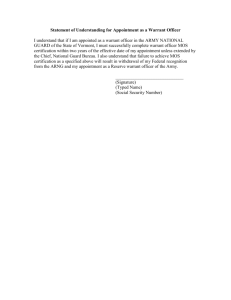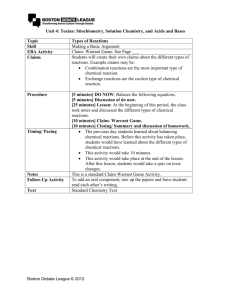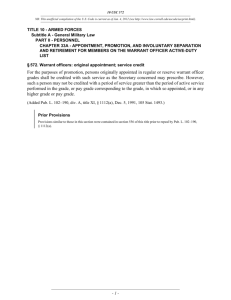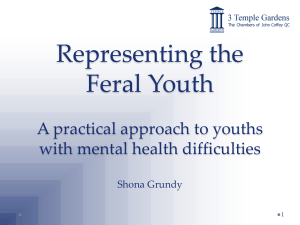EUROPEAN ARREST WARRANTS
advertisement
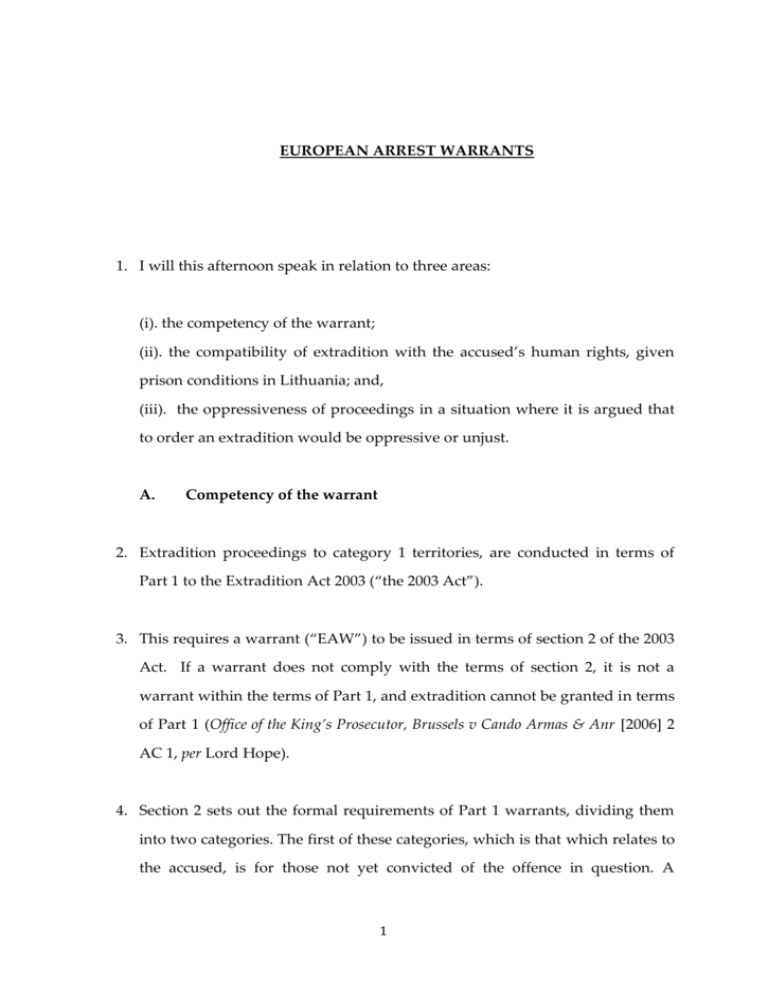
EUROPEAN ARREST WARRANTS 1. I will this afternoon speak in relation to three areas: (i). the competency of the warrant; (ii). the compatibility of extradition with the accused’s human rights, given prison conditions in Lithuania; and, (iii). the oppressiveness of proceedings in a situation where it is argued that to order an extradition would be oppressive or unjust. A. Competency of the warrant 2. Extradition proceedings to category 1 territories, are conducted in terms of Part 1 to the Extradition Act 2003 (“the 2003 Act”). 3. This requires a warrant (“EAW”) to be issued in terms of section 2 of the 2003 Act. If a warrant does not comply with the terms of section 2, it is not a warrant within the terms of Part 1, and extradition cannot be granted in terms of Part 1 (Office of the King’s Prosecutor, Brussels v Cando Armas & Anr [2006] 2 AC 1, per Lord Hope). 4. Section 2 sets out the formal requirements of Part 1 warrants, dividing them into two categories. The first of these categories, which is that which relates to the accused, is for those not yet convicted of the offence in question. A 1 warrant in relation to such a person must contain both a statement and information, whose contents are provided for by subsections 3 and 4: (3) The statement is one that— (a) the person in respect of whom the Part 1 warrant is issued is accused in the category 1 territory of the commission of an offence specified in the warrant, and (b) the Part 1 warrant is issued with a view to his arrest and extradition to the category 1 territory for the purpose of being prosecuted for the offence. (4) The information is— (a) particulars of the person's identity; (b) particulars of any other warrant issued in the category 1 territory for the person's arrest in respect of the offence; (c) particulars of the circumstances in which the person is alleged to have committed the offence, including the conduct alleged to constitute the offence, the time and place at which he is alleged to have committed the offence and any provision of the law of the category 1 territory under which the conduct is alleged to constitute an offence; (d) particulars of the sentence which may be imposed under the law of the category 1 territory in respect of the offence if the person is convicted of it. 5. Central to the warrant, then, is a statement required by subsection 3(a) that the person in respect of whom the warrant is issued is accused of an offence. 2 6. This requirement is significant in the context of this case as the particulars of the circumstances of the offence contained within the warrant are in the following terms: In April xxxxxx, in [country specified but redacted] (exact time and place not established during pre-trial investigation) xxxxxxxx deliberately put a plastic bag on the head and face of her xxxxxx born on 3 April xxxxx. In the environment with decreasing oxygen concentration the victim died from asphyxiation. In this way xxxxxxxxx deliberately murdered xxxxxxx. xxxxxxx is suspected of committing a criminal act specified in the item part 2 art. 129 of the Criminal Code of the Republic of xxxxxxx. 7. The argument before the court was whether the EAW statement gave rise to any potential objections, and it did what were those objections. 8. Ultimately the objections to the EAW argued before the court were two fold: (i). firstly, that the warrant does not contain a statement that the person in respect of whom the EAW was granted did not state in specific explicit terms that the individual was accused of an offence; and, (ii). secondly, that the time and place of the alleged offence are not sufficiently detailed for the purposes of the Act; in that it did not specify a city or district or state. Rather it simply set out that the alleged crime was perpetrated in a named country without any specification of a district or a city or town. 3 (i) Statement that person is accused 9. The final paragraph of the detail of the alleged offence, then, stated that the accused was merely suspected of committing the crime, whereas the 2003 Act ( section 2 (3)(a)) requires a statement that the person in respect of whom the warrant is issued is actually accused of the crime. 10. The courts have been wary of interpreting this requirement in an overly technical fashion, mindful of the differences between the UK legal systems and the civilian systems of mainland Europe; the words of section 2 have therefore been considered in what has been described as a cosmopolitan way (Asztaslos v Hungary [2011] 1 WLR 252). The question being was the purpose of the extradition for the conduct of the prosecution or for the purpose of investigation is a question that should be able to be answered by examining the EAW. 11. Examining the EAW as a whole the court adopting the approach deployed in Asztaslos will have to determine if what is being presented to it is: (i). An “accusation warrant”; (ii). If it is the court must be satisfied that the requested person is an accused person as required by the terms of the statute; and (iii). The court will look at the wording of the warrant as a whole to decide whether the EAW indicates unequivocally that the purpose of the EAW is a request to have the individual extradited for prosecution 4 12. If the EAW is simply an attempt to engineer the surrender of the requested person for the purpose of conducting an investigation to see if that person should be prosecuted, that is not a legitimate purpose and any such EAW will not be in conformity with section 2 of the 2003 Act. See case of Armas at paras’ 28 and 54. 13. Thus, in Dabas v Spain [2007] 1 WLR 145, it was accepted that the appellant had been accused for the purposes of the Act even though there was no explicit statement to that effect. The distinction between a person considered an accused, and one who is not, was given by Jack J: If [a person] is wanted for prosecution, and the warrant later describes the offence and sets out its circumstances and gives the statutory provision which he is alleged to have infringed, it is very difficult to see how he can be described other than as an “accused” even if there is no statement using that word. The subject of such a European arrest warrant is clearly more than a suspect or someone who is wanted for questioning. 14. Similarly, in the recent case of Assange v Sweden [2011] EWHC 2849 (Admin), the court took the view that, notwithstanding the absence of a statement that the appellant was accused of the offence in question, the content of the warrant made clear that this was the case. Moreover, at paragraph 140, the President of the Division noted that: “Nothing in the EAW suggested he was wanted for questioning as a suspect”. 15. So one would be forgiven for thinking that things were looking quite good for the extradite in this case. 5 16. In determining whether the subject of a warrant is accused or wanted for questioning, the English courts have effectively taken as a starting point the statement at the top of the warrant that the subject of the warrant is wanted for prosecution. In Dabas, it was held that this statement should only be disregarded if the context of the warrant threw clear doubt on its prima facie meaning; Latham LJ stated that nothing in the warrant in Dabas could be taken as justifying that conclusion. The pro- forma wording of the preamble to the EAW is not necessarily determinative of the issue of whether as a whole the requirements of s (2)(2)(a)(b) have been satisfied. 17. Subsequent authorities were reviewed in the recent case of Asztaslos, with Aikens LJ taking the view that the question for the court was whether the warrant was equivocal or unequivocal. 18. It would appear, then, that the standard required to render a warrant incompetent is doubt as to the status of the person in question, and not, for example, satisfaction on the balance of probabilities. 19. The present case is, was as it turned out on the borderline of that test. On the one hand, the relevant authorities of the country seeking extradition can be said to have set out sufficient detail of the alleged offence for the court to conclude that the accused could be described as such for the purposes of the Act. 20. On the other, it is difficult to conceive of a clearer indication that a person is regarded as a suspect than the use of the word “suspected”. 6 21. It is correct that the words of the warrant are construed in a cosmopolitan fashion. However, “suspected” does not have quite the same technical overtones as “suspect”, and the latitude which may be allowed in respect of “suspected” should, it was submitted to the court, be less than that accorded to “suspect”. Further, it is clear from the narrative of the alleged offence as specified in the EAW, that the relevant authorities in the country seeking extradition of the extradite do not have a full picture of its circumstances. The court could not it was submitted be certain that investigations are at an end, and that the accused is not required for questioning. The Crown were asked to assist in this regard and needless to say did not. 22. As noted above, the issue for the court has been described as whether the warrant as a whole is equivocal or unequivocal. It was submitted that the use of the word “suspected” renders the warrant equivocal. 23. Even allowing for the cosmopolitan interpretation of legal terms, the use of “suspected”, it was submitted cast doubt on the status of the accused in the eyes of the Lithuanian authorities, and thereby renders it incompetent. It does not allow a court to say, as in Dabas and Assange, that there is nothing in the warrant which suggests that the accused is wanted as a suspect rather than as an accused. 24. For completeness, I would note that the English courts have in the past admitted extrinsic evidence from the relevant authorities where there has been some ambiguity as to whether the subject of the warrant was accused or wanted for questioning. Following Asztaslos, use of such evidence is to be restricted to exceptional cases. 7 (ii) Particulars of time and place 25. As with the subsection 3(a) statement, the requirement that a warrant provides the time and place of the alleged offence is not interpreted in line with domestic requirements as to specification (Fofana v Thubin [2006] EWHC 744 (Admin)). In this case it was submitted that the EAW does not narrate the last known address of the extradite. 26. The warrant is required to provide sufficient detail to let the extradite know what they are accused of doing, when they are accused of doing it and where they are accused of doing it (Von Der Pahlen v Austria [2009] EWHC 383 (Admin)). 27. The amount of detail required may turn on the nature of the offence (Ektor v Netherlands [2007] EWHC 3106 (Admin)). A failure to specify a precise locus when that information was known has been held to render the warrant defective (Taylor v Germany [2012] EWHC 475 (Admin)). 28. The offence for which extradition is sought is that the accused asphyxiated the deceased, in April xxxxxx, somewhere in xxxxxxx. The time and the place as specified in the EAW are therefore not particularly specific. The former is perhaps unobjectionable, as it is easy to conceive of reasons why a prosecutor would not able to specify the precise date of an offence (although the warrant could at least have excluded the two days prior to the deceased’s birth). A range of one month has indeed has been accepted as sufficiently particular in the English courts (Hewitt v Spain [2009] EWHC 2158 (Admin)). 8 29. The adequacy of the locus is somewhat more questionable. Whilst, again, prosecutors may not be able to ascertain the precise location of a murder, and therefore require to be general, it seems slightly surprising that they are unable to be at least slightly more specific than that the alleged offence took place in xxxxxxx. 30. Loci comprising entire countries have been accepted as sufficient for the purposes of the Act in the English courts. In R (McGoldrick) v Hungary [2009] EWHC 2816 (Admin), a stated locus of Hungary was held to be acceptable, although that case referred to widespread distribution of material, and the narration of the allegation detailed the offices of the companies involved. In Farnesi v Italy [2009] EWHC 1199 (Admin), the warrant specified Italy, although Pisa appears to have been mentioned as the centre of the conspiracy in question. In Ektor, a warrant relating to people smuggling was upheld where it specified the loci as England, Nigeria and the Netherlands. In all of these cases, though, the offences could be characterised as a course of conduct, in respect of which it was impossible to be precise about a single location. Indeed, in McGoldrick and Farnesi, there was at least indication of a more precise locus. 31. It was submitted that the lack of precision in the location renders the warrant incompetent. Parliament must have intended that warrants specify more than the name of the territory issuing the warrant; it is almost implicit in an international arrest warrant that the alleged offence took place within the jurisdiction of the issuing authority. The warrant in this case provides the accused with no real detail as to where the offence is alleged to have taken place. Further, the alleged offence was a single act committed in a single location. There is no immediately apparent reason why the relevant 9 authorities of the country seeking extradition are unable to be precise as to the town or region in which the offence was alleged to have been committed. B. Prison conditions in country making extradition request 32. Section 21 to the 2003 Act provides that a judge must consider whether extradition would be compatible with the subject’s rights under the ECHR, and order that the subject be discharged if it would not be so compatible. 33. The conditions in the prisons of the country seeking extradition which are said to have been found by the Strasbourg court to amount to torture, inhuman or degrading treatment for the purposes of Article 3 to the ECHR. This raises the question of whether the accused could rely upon section 21 to evade extradition. 34. A similar argument was attempted in the case of Kropiwnicki v Lord Advocate 2010 JC 229. The state seeking extradition in that case was Poland, whose prisons had similarly been criticised by the Strasbourg court in the case of Orchowski v Poland Application number17885/04 35. The High Court allowed extradition, holding that the findings in Orchowski related to specific prisons in the period from 2003 to 2009. Orchowski also demonstrated that the Polish authorities had improved prisons during this period, and were continuing to do so. The High Court was not able to infer from Orchowski that there were substantial grounds that the accused was faced with a real risk to breach of his article 3 rights if he was to be extradited. 10 36. The relevance of the conditions of prisons of the country seeking extradition has additionally been considered in a number of English cases. Their approach bears some similarity with that of the High Court. In Janovic v Lithuania [2011] EWHC 710 (Admin), expert evidence was led as to the overcrowded conditions at one of the prisons named in papers. This evidence was not, though, sufficient to demonstrate substantial grounds of a real risk to breach of article 3 rights; what was required was evidence that the accused was likely to be exposed to such conditions. No such evidence was led. 37. Janovic can be contrasted with Batayav v Secretary of State for the Home Department (No. 1) [2003] EWCA 1489, where a finding that prison conditions fell below Article 3 standards for most prisoners in Russia was sufficient to allow an appeal. 38. The only evidence available is a summary of various judgments and reports, which provide only the type of general evidence referred to in Janovic. It may be that expert evidence would suggest that the accused would be likely to suffer such conditions; it may be, for example, that female prisoners are particularly exposed to them. C. Accused’s mental condition 39. Section 25 to the 2003 Act provides that, if the physical or mental condition of the person in respect of whom a Part 1 warrant is issued is such that it would be unjust or oppressive to extradite them, then the judge must either order the person’s discharge, or else adjourn proceedings until this is no longer the case. 11 40. This requires a high threshold to be met, reflecting the public interest in giving effect to treaty obligations in extradition cases (Howes v HM Advocate 2010 SLT 337). The cogency of the public interest may depend upon the seriousness of the charges; thus, it may be oppressive to extradite a person charged with trivial offences (Maziarski v HM Advocate [2012] HCJAC 33). The adequacy of treatment facilities for the accused is also highly relevant. 41. It would seem that the seriousness of the accused’s mental state would require to meet the standard required by section 25 of the 2003 Act. That is that it would be unjust or oppressive to order that the extradition take place. 42. This would in the ordinary course of events require information and evidence of a mental disorder to such a degree that there is a substantial risk of suicide or at the very least evidence of suicidal ideation. It will not be enough to submit that the most that can be said is that extradition will increase the risk of harm; but that can presumably be said of many extraditions. 43. The end! 12 LIST OF AUTHORITIES 11. Kropiwnicki v Lord Advocate 2010 JC 229. 12. Orchowski v Poland Application number17885/04 1. Office of the King’s Prosecutor, Brussels v Cando Armas & Anr [2006] 2 AC 1. 13. Janovic v Lithuania [2011] EWHC 710 (Admin). 2. Asztaslos v Hungary [2011] 1 WLR 252. 14. Batayav v Secretary of 3. Dabas v Spain [2007] 1 WLR 145. State for the Home Department (No. 1) [2003] EWCA 1489. 4. Assange v Sweden [2011] EWHC 2849 (Admin). 15. Howes v HM Advocate 2010 SLT 337. 5. Fofana v Thubin [2006] EWHC 744 (Admin). 16. Maziarski v HM Advocate [2012] HCJAC 33. 6. Ektor v Netherlands [2007] EWHC 3106 (Admin). 7. Taylor v Germany [2012] EWHC 475 (Admin). 8. Hewitt v Spain [2009] EWHC 2158 (Admin). 9. R (McGoldrick) v Hungary [2009] EWHC 2816 (Admin). 10. Farnesi v Italy [2009] EWHC 1199 (Admin). 13 14

